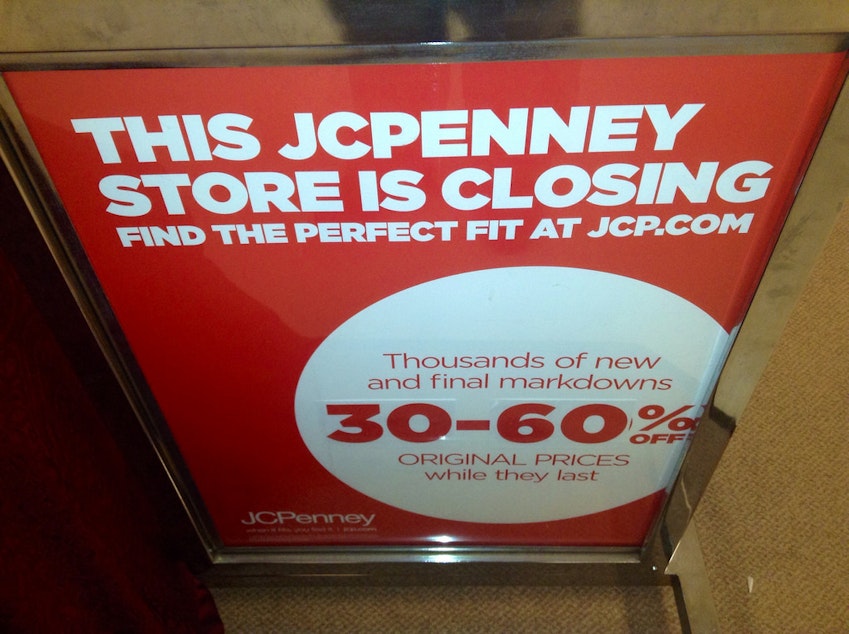JCPenney No Longer Holds Up To The ‘Theater Of Retail’

Staff at JCPenney in Bellevue are preparing for the store’s closure. In November the store ends its 59-year run in Bellevue Square.
JCPenney, a flagship of the middle class, has been struggling for years. The Texas-based retailer closed 33 under-performing stores across the country earlier this year. Then in September it added Bellevue to the list.
When a store like JCPenney can’t survive in a place where it prospered for six decades, it says something about the shopper it used to represent. And because JCPenney for decades defined a middle class standard of living, the story is about the middle.
The economic collapse six years ago was more than a shock. It was life-changing. Now many more middle income shoppers are cautious. They are leery of credit card debt. Many wages have not recovered from the recession, so shoppers focus on needs. And they search for deals on the Web and in stores.
“I look at the Great Recession being to my generation what the Great Depression was to my grandparents,” said Patricia Edwards, managing director of investments at U.S. Bank’s Private Client Reserve and a lifetime follower of retail trends.
Sponsored
“Really just changing how we look at money, changing how we look at possessions and changing how we look at our lives and what is important.”
Learning how to sell on the Web hasn’t been enough for retailers who cater to people with moderate incomes. Retailers with more a up-market customer can sell on other perceptions of value or on the quality of the shopping experience.
But there are many players competing on price, many of whom specialize. Stores like JCPenney, which for decades succeeded at being a store for everything, often can't win.
A year ago JCPenney tried a different strategy. It sought to end the regular discounting designed to draw in middle income adults and tried to appeal to a new customer: the young and fashion conscious.
But the young are a demanding crowd.
Sponsored
“I’m going to be honest here. It’s all about labels and what’s in,” said Sesha Richter, 18, a student who works at lingerie retailer Victoria’s Secret.
She said she adores Forever 21, because she sees clothes there before she sees them in magazines. And she treasures special pieces, which is why she saves up for a few items from Nordstrom’s Topshop. “It’s from the UK, I believe, and it’s super, super trendy and fun. Although, I can’t afford it.”
She visited the Bellevue JCPenney recently. Once inside, Richter was polite.
“I don’t think I see one thing in here that is not on sale, to be honest," she said. "Although they have great fashions, it’s a lot of still trying to sell from summer -- like here a lot of dresses and light sweaters -- still trying to sell from summer stuff rather than going into what’s now.”
Richter, who used to work at JCPenney in Southcenter, said this wasn’t just because this store was closing. It was always going on. “Not everything sells on the floor, and that means nothing sells in back-stock and that process just goes on and on," she said.
Sponsored
Appealing to a younger customer didn't work for JCPenney, and now there will be a large hole at Bellevue Square. There's no announcement yet from the mall’s owner, Kemper Development Co., about a replacement.
But if you look around the mall, it’s early to see what is surviving and thriving here. Victoria’s Secret is packed. There are men carrying iPhone boxes and tiny boxes from jewelry stores. And there is optimism.
Even Richter checks out the high-priced goods. “There’s the Tesla over there that I love to just go and look at,” she said. “Because it’s so beautiful and it’s like, one day I wish, that would be my dream car.”
Hope, ambition, aspiration: Shoppers still can feel them. Analyst Patty Edwards said though retailing is a harder business than ever, retailers have faith in the magic of the mall.
“They don’t want the experience of retail and the theater of retail to go away. And that’s really what this is: this is theater.”
